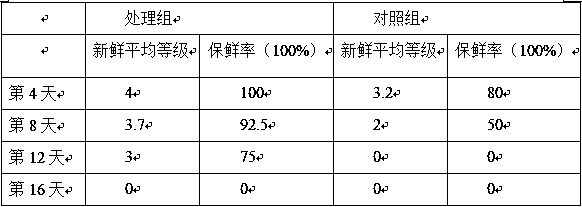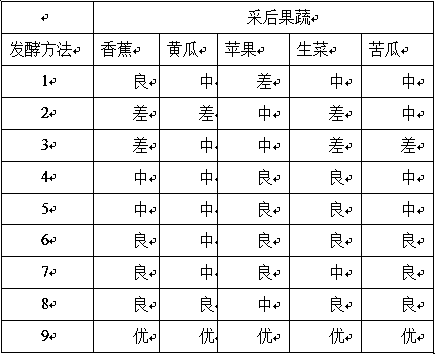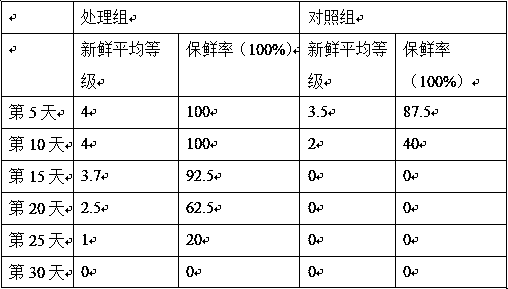Biologic fresh-keeping microbial inoculum fermented with yellow serofluid generated during making bean curds and application of biologic fresh-keeping microbial inoculum to fresh keeping of fruits and vegetables
A technology of biological preservation and yellow slurry water, which is applied in the protection of fruits/vegetables with protective layers, preservation of fruits and vegetables, and methods based on microorganisms, etc. Cumbersome and other problems, to achieve the effect of low production cost, good inhibition effect and high bacterial concentration
- Summary
- Abstract
- Description
- Claims
- Application Information
AI Technical Summary
Problems solved by technology
Method used
Image
Examples
Embodiment 1
[0029] with Bacillus subtilis ( Bacillus subtilis ) number CGMCC No.13932 preparation of biological preservatives
[0030] Preparation of biological preservatives: Bacillus subtilis ( Bacillus subtilis ) strain was inoculated into Bacillus subtilis ( Bacillus subtilis ) liquid medium, cultured on a shaking table at 30°C for 8-14 hours to obtain seed liquid: inoculate the seed liquid into a large amount of fermentation medium at a volume ratio of 10%, and cultivate at 180-220rpm / min: collect the fermentation liquid directly after the fermentation is completed, Thalline concentration reaches 10 in the fermented liquid 13 CFU / ml, the concentration of γ-polyglutamic acid reaches 30g / L, the output of antimicrobial peptides reaches 1.2~2g / l, and the fermentation broth is directly used as a biological fresh-keeping agent.
[0031] The composition of the seed medium: glucose 10% (w / v), soybean peptone 15% (w / v), calcium chloride 0.1% (w / v), potassium dihydrogen phosphate 0.05% (w / v...
Embodiment 2
[0034] Effects of Biological Preservatives on Preservation of Bananas after Picking
[0035] Buy bananas from the market that are ripe, have no mechanical damage, are of equal size, and have no disease spots and good color. After fully shaking the biological antistaling agent prepared in Example 1, spray it on the surface of the fruit to be treated with a watering can. Sterilized water was used as the control group, and the treatment group and the control group were stored under the same conditions (25-30°C). The freshness of the fruits was regularly observed, and the freshness was graded according to the following standards, and the freshness preservation rate at different time points was calculated (all Fruit freshness mean / highest freshness series), the results are shown in Table 1
[0036] Banana freshness grading standard (based on personal subjective judgment): Grade 0: Severely rotten; Grade 1: Beginning to rot (yellow area of the peel > 50%), can be pinched with han...
Embodiment 3
[0041] Post-harvest Fresh-keeping Effect of Biological Preservatives on Cucumber
[0042] Buy cucumbers with pure varieties, no mechanical damage, equal size, no disease spots and good color from the market. After the biological antistaling agent prepared in Example 1 is fully shaken, spray it on the surface of the vegetables to be treated with a watering can. The amount of spraying is advisable to completely wet the vegetables. Sterilized water was used as the control group, and the treatment group and the control group were stored under the same conditions (25-30°C). The freshness of the fruits was regularly observed, and the freshness was graded according to the following standards, and the freshness preservation rate at different time points was calculated (all Vegetable freshness average / highest freshness series), the results are shown in Table 2
[0043] Cucumber freshness grading standard (based on personal subjective judgment): Grade 0: severe rot; Grade 1: beginning ...
PUM
 Login to View More
Login to View More Abstract
Description
Claims
Application Information
 Login to View More
Login to View More - R&D
- Intellectual Property
- Life Sciences
- Materials
- Tech Scout
- Unparalleled Data Quality
- Higher Quality Content
- 60% Fewer Hallucinations
Browse by: Latest US Patents, China's latest patents, Technical Efficacy Thesaurus, Application Domain, Technology Topic, Popular Technical Reports.
© 2025 PatSnap. All rights reserved.Legal|Privacy policy|Modern Slavery Act Transparency Statement|Sitemap|About US| Contact US: help@patsnap.com



